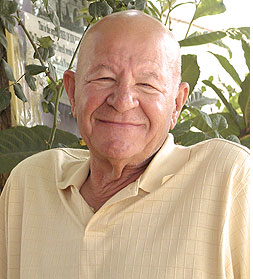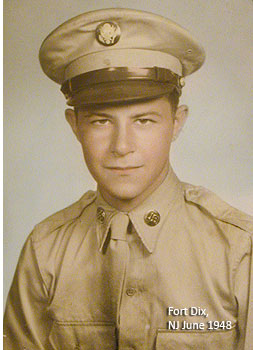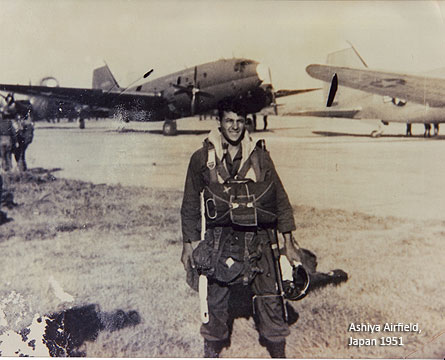Don’t condemn the dreamer: The Story of a Cypriot-American Soldier
By Katerina Georgiou
At the age of 11, Constantinos (Gus) Georgiou’s impressionable mind was filled with newspaper images of German paratroopers landing on the island of Crete. It was 1941, and though he lived in nearby Cyprus he wanted to recreate, what seemed to him, an unfathomable sight. So he climbed to the roof of his family’s outdoor kitchen and eyed the soft earth sixteen feet beneath him. Then he opened an umbrella and jumped off the ledge.

He landed in a pile of kopria (manure) but that wasn’t enough to deter him from his dream of joining the army. Despite his youth, he sensed that the changes sweeping the world might someday fill history books. Seven years later, he found himself leaping from planes as a paratrooper in the U.S army.
His decision meant dropping out of high school in the 10th grade, devastating his Cypriot-born parents. His mother left school prematurely to care for her five siblings and the harsh reality of an illiterate life had her often warning her seven sons: “don’t be blind for the rest of your lives like me.” His father hoped Gus would become a schoolteacher, the classroom being a safer outlet for his son’s unbridled curiosity.
With life in Cyprus relatively peaceful, his parents couldn’t understand why their son would choose such a dangerous path. To Gus, the answer was clear one evening when he overheard a revelation: the village of Neo Chorion (Kythrea)—the only home he’d ever known—wasn’t his birthplace. He, and two of his brothers were born in Clairton, Pennsylvania, the steel mining town where his father had worked as a laborer on and off for almost 14 years. Eventually, he saved enough money to buy a farm in Cyprus from his Armenian former employer. This farm, on which Gus and his brothers were raised, now remains under Turkish occupation.
 “When I learned that I was born in one of the strongest military countries in the world I felt pride,” says Gus. “I read in the newspapers what the American troops were doing in Europe and considered them my compatriots.”
“When I learned that I was born in one of the strongest military countries in the world I felt pride,” says Gus. “I read in the newspapers what the American troops were doing in Europe and considered them my compatriots.”
He left Cyprus in 1947 on the Saturnia, the same Italian vessel that transported him from America as a 2 year old. Unable to speak English, he took the army entrance exam three times before becoming a paratrooper in the 82nd Airborne Division. Then, the Korean War began at the end of his three-year commitment and his enlistment was extended for another year.
Complicating matters, his American-born brothers who had also moved back to the States were drafted and sent to Europe.
“In one year my mother had three boys in the American army. There aren’t too many families that had three kids serving at once!” he chuckles.
While stationed at Fort Benning, Georgia, he took correspondence courses and received his high school equivalency diploma. A mentor encouraged him to apply to the Georgia Institute of Technology but to gain admission he had to pass an American history exam. So before leaving for Korea, he loaded his duffle bag with 16 volumes of text.
The military had formed a special team known as the Airborne Rangers (later renamed the Green Berets) to implement the UN resolutions aimed at stopping the invading North Koreans. Soon Gus found himself not only studying history but also making it.
When he was later wounded and operated on to remove the shrapnel from his leg, a fellow soldier discovered the encyclopedic books.
“I’ll never forget what he said when he opened my bag,” says Gus. “What did this Greek come here for—to study history or to fight a war?”
He smiles before continuing. “I always thought that the knowledge I had about the ancient Greeks made me a better soldier. I admired those who fought the battles of Thermopylae, Marathon and Salamis.”
History taught him that freedom is an ideal everyone must possess before anyone can truly experience it. He witnessed it in the Cypriot struggle to break free from British colonial rule. Bitter disappointment followed when resolutions he went to implement in Korea weren’t upheld in Cyprus during the Turkish invasion, but it didn’t undermine the importance of his work in Korea.
“I always felt that the greatest mission of any man in life is to serve his country honorably,” he says. “And I still believe it.”

By the time he received his honorable discharge, Gus had not only passed his American history exam with distinction but was awarded a Purple Heart.
He completed his degree in chemical engineering from Georgia Tech in three years and relocated to Wilmington, Delaware, beginning a 41 year career with Dupont, a leading American chemical company.
Along with his now departed wife, Georgiean, he has supported the advancement of Greek studies through various causes, including being benefactors of the Odyssey Charter School in Wilmington, an AHEPA sponsored Greek immersion school for inner city children. They also created a professorship at Stockton College in Greek History through the American Foundation for Greek Language and Culture.
“We wanted to help kids get as much pleasure from life as we did,” he says. “When you study Greek history and the classics you learn the essence of sophrosine—everything in moderation.”
“I took a lot of risks in life,” he says. “But in the end, education helped me achieve harmony and balance.”